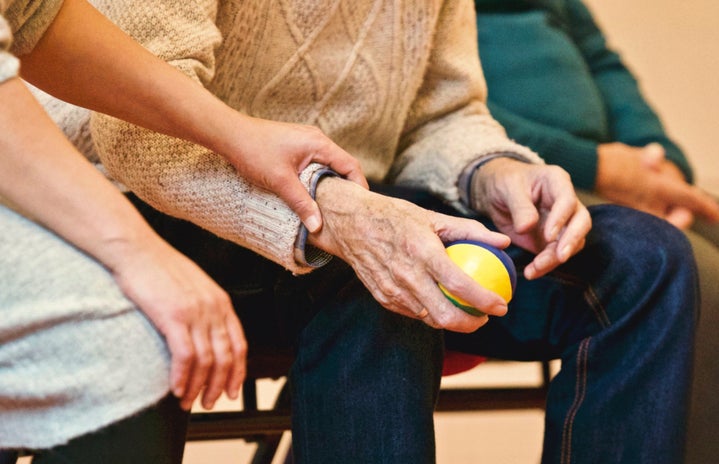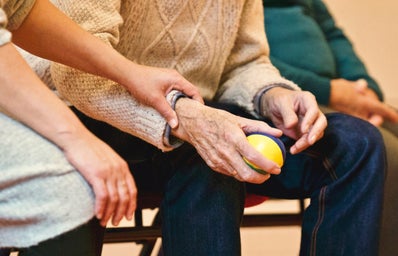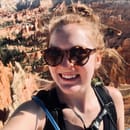This past week, I had the privilege to interview Dr. Harold Braswell. I originally heard him speak at the Scholar Strike about racial inequalities in dying— not throughout life or at death, rather during the physical act of dying. Being a caregiver at an assisted living home myself, topics involving the geriatric population tend to grab my attention, so I wanted to learn more about his work.
As I logged onto the Zoom call, the first thing I saw was Dr. Braswell holding his child in a room filled with Hot Wheels posters. Throughout the interview, Dr. Braswell spoke of himself as a “married, middle aged guy” who has appreciated the time he’s had during COVID-19 to play with his two kids. I can confidently say that, from the two times I have briefly heard him speak, Dr. Braswell’s humble description of himself doesn’t do justice to what he has contributed (and still contributes) to the community. At Saint Louis University (SLU), he is a professor at the undergraduate, masters, and PhD level, does research on developing a disabilities studies approach to studying bioethics, and is the director of undergraduate programming in bioethics and health studies.
When asked about his family, Dr. Braswell spoke of his mother who was deaf, not taught sign language at the public school she attended, and in turn had an intellectual disability due to language deprivation syndrome. Stemming from growing up with a mother with a disability, Dr. Braswell read “The Disabilities Studies Reader, 1st Edition” by Lennard J. Davis, which marks a turning point in his life. This book opened his eyes to how his relationship with his mother is not just due to his own thoughts and actions, rather it has been mediated by the history of social depictions of mothers, the structure of the healthcare system, and how people with disabilities are treated.
Around the same time that he read this book, he watched the movie “Million Dollar Baby”—a Clint Eastwood film about a person with disabilities who wants to be euthanized. This movie brought up another perspective beyond the typical (but no less important) discussions about pro-choice and pro-life from the secular disability studies writers. This view is considered even further left than the liberals, and yet they were against euthanasia. This particular point of view speaks to a double standard in the treatment of suicide and those with disabilities versus not. They say that euthanasia is not liberating; rather it implements the idea that people with disabilities have a life less worth living. As a pro-choicer himself, this was the first Dr. Braswell had heard of being a secular liberal person while also being anti-euthanasia. With the combination of these two resources (“The Disabilities Studies Reader” and “Million Dollar Baby”), Dr. Braswell decided he wanted to be more involved in disability studies and politics, as well as he found a new “purpose to thinking”. Shortly after, he attended Emory University for an interdisciplinary PhD program before accepting a job at SLU.
In 2019, Dr. Braswell published his first book, “The Crisis of US Hospice Care”. This book delves into details of the family care approach of the U.S. hospice system—a system dependent on unpaid family caregivers at home to provide long term care for the dying. Although perhaps based on the good intentions that people prefer to die at home (along with the federal government’s desire to save money on hospital beds and staff), a home-based hospice system can lead to issues when there is no family to remain at home with the patient. While researching for his first book, Dr. Braswell read “The Case for Reparations” by Ta-Nehisi Coates which opened a larger discussion about anti-Black housing discrimination.
“Anti-black housing discrimination seems like a very significant shaper of housing in America and what we mean by the home context. What implications does this have for our end of life care system, particularly given that this end of life care system was meant to be delivered within the home?” said Dr. Braswell.
Many questions come to mind: is hospice accessible to Black people in urban environments? How are the discriminatory housing practices that have lowered the value for generations of Black peoples’ homes now impacting the price at which one can sell their house/pay for non-Medicaid based living facility at an old age? Expanding on all these questions, Dr. Braswell is now working on his new book “Inhospitable: How Housing Discrimination Shapes the Way We Die”.
“Dying as a category should have a more prominent role in the way we think about racism in America,” Dr. Braswell said of his new book.
As the insightful Zoom call was coming to an end, I asked Dr. Braswell about any advice he could impart onto us as college students, future healthcare providers, and members of society. He encourages us to listen to racial minority groups and develop meaningful patient and healthcare provider relationships. He spoke of how his desire to be a professor stemmed from being a college student once.
“College”, Dr. Braswell says, “is a rich time of life for development.”
He recommends taking advantage of this rich time by exploring different parts of the city, experiencing classes outside of your major, and perhaps most importantly—being open minded.
Dr. Braswell ended the meeting by saying, “You don’t ever really know the next person, book, or experience that can dramatically change your life. It usually is not something that you can foresee, and so, it’s important to keep a sense of openness.”



